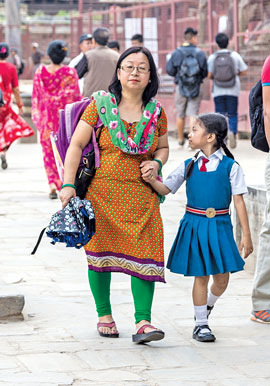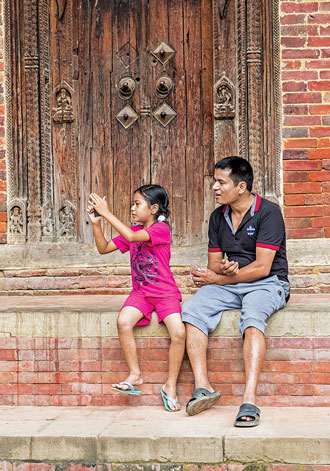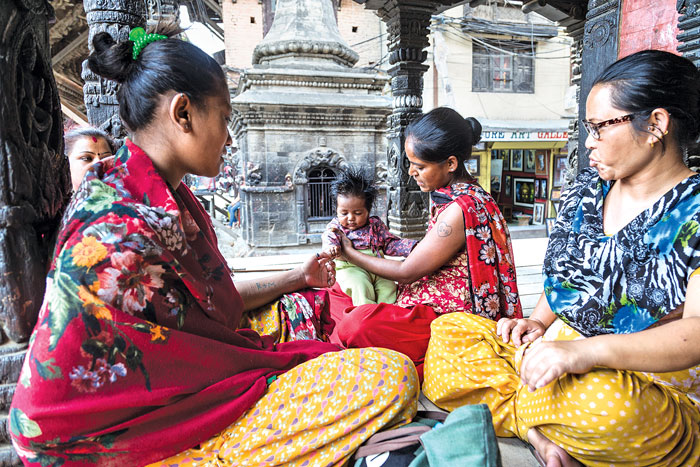It was almost midnight. We—a friend and I—waited with some impatience outside the hospital delivery room. There were no other patients or visitors. Finally, the swing doors opened, and an orderly wheeled out my wife on a table with our newborn child. The doctor walked beside her, and shaking my hand, said, “Congratulations. It’s a girl.”
 The baby had a head full of dark black hair, that’s what I noticed first. Her face was puffy, and her eyes were screwed shut. She seemed quite large. I was as thrilled as could be! I congratulated my wife. She gave me a funny kind of look. Sometime later, after they were settled in their room, my friend and I went outside for a smoke. After a few puffs, my friend turned to me, and said, “Congratulations. But, it would have been better if it had been a boy, wouldn’t it?”
The baby had a head full of dark black hair, that’s what I noticed first. Her face was puffy, and her eyes were screwed shut. She seemed quite large. I was as thrilled as could be! I congratulated my wife. She gave me a funny kind of look. Sometime later, after they were settled in their room, my friend and I went outside for a smoke. After a few puffs, my friend turned to me, and said, “Congratulations. But, it would have been better if it had been a boy, wouldn’t it?”
I was taken aback by his remark; didn’t expect this from a well-educated guy living in the 21st century. Anyway, my next task was to call my parents and give them the good news. My dad’s response was: “Congratulations, Goddess Laxmi has entered your home.” Now, that was the kind of thing I wanted to hear!
Those bygone days
I am the only son among five siblings. I have been constantly told about how happy my father had been when I was born after three daughters. Although I grew up with my uncle (I was put in a missionary school in a hill station where they lived), I did spend the early years in my own home, and also at least three months of winter holidays every year. So, I can well remember that I was a pampered child, even though we weren’t well-off. I can clearly recall sitting down for meals with my father, while my mother and sisters hovered around us. I also recall being given one egg every morning at breakfast, a commodity that my sisters had to do without most of the time, since they cost a pretty paisa.
Things then were more or less the same with most families that I knew about. A son was a gift, a daughter, not much so. Besides the ultimate benefit of being blessed if one’s last pyre was lit by a son, parents obviously looked forward to their sons to provide for them in their old age. Daughters would marry (incurring much cost) and would have families of their own, while a son was expected to earn and live with his parents, looking after their needs. These facts were givens. So it is understandable that, in those days, sons received much higher priority than daughters.
However, my father insisted on all his children getting a college education. You could say that he was probably one of the enlightened ones in those days, when daughters had to do all the household chores and were married off early. Anyway, two decades down the line, I now had a little daughter off my own. We were in the 21st century, and naturally, there was no question about a daughter being any less equal than a son. (By the way, that funny look of my wife as she came out of the delivery room, I found later, was her apprehension about whether I was happy to have a daughter instead of a son.)
 Early days of a new age
Early days of a new age
I had quite a hand in raising my child, my precious firstborn, and the only one, as it transpired. It wasn’t an easy task raising an infant by ourselves, without the wise advice of elders, since we lived away from our parents in another city. I would advice others to get as much help as possible from their elders in this onerous task. Experience, after all, is the greatest asset, notwithstanding modern medicine, specialist pediatricians, and new ideas of raising children. Long and short of it, we—my wife and I—would find ourselves at wit’s end many times, not knowing why the child wasn’t eating enough, why she was regurgitating most of the expensive baby food we fed her, and why she sometimes started wailing for no rhyme or reason.
There wasn’t much question about the direction her life would take. We put her in a kindergarten school at an early age. Her first day of school is one that I often recall fondly. There she was, all excited, dressed up smartly in a brand new uniform, with her hair tied with ribbons, and with a colorful school bag on her back and a nifty looking water bottle around her neck. Being an outgoing sort, she seemed to be really looking forward to her first day in school. We were naturally happy to see her so positive and happy. Inside the school, as she lined up with the other children for the assembly, she glanced over at us, smiled, and then couldn’t stop herself from shedding a couple of tears. We reluctantly waved goodbye. However, it being the first day, we were allowed to take our children home at around noon. So, I went to pick her up. There she was, running around the grounds with new friends, looking pretty much at home. We didn’t have to coax her to go to school, that day onwards, let me tell you!
Though our society is still pretty traditional (taking pride in one’s customs and upholding them is a good thing), there is no bias in the treatment of, and behavior towards, sons and daughters. It is as clear as daylight that girls are on equal footing with boys nowadays. So, raising my daughter in such an environment was a cakewalk in this sense; of course, that left me with even bigger responsibilities of ensuring that she was given every opportunity to grow up strong, happy, and confident. We conducted all the usual customary rituals that had to be performed at different stages of growing up with as much pomp and ceremony as we could reasonably afford. Besides this, her birthdays were, of course, highlights of the year. I remember that her second birthday, in particular, was a very special one, since the first birthday is not celebrated in our society.
Time flew by, with her coming-of-age ceremony, known as Bel Bibah, observed when she was around 12 years of age. It’s an intricate ritual that holds immense significance in any girl’s life. First, she has to stay hidden in a dark room for a period of 10 days (called gufa rakhnu, literally meaning being put in a cave). The main thing is that she mustn’t look at the sun during this period. After 10 days, she makes her appearance outside, and worships the sun. Then, she undergoes the ceremony of Bel Bibah, in which she is symbolically married to the bel fruit. This means that she can henceforth never be a widow in her coming life, even if her real husband dies before her, having been also married to the bel fruit which represents some god.
As expected, the explanations behind this ritual are quite complex. However, for me, it also holds another meaning. It reminds the parents, the father especially (since he is usually the breadwinner), that their daughter has grown up now, and is almost a woman, so better prepare yourself for the coming years when the next most important stage in her life—that is, marriage—will have to be celebrated. Not only is it, customarily, the highest point of a daughter’s life, it is also the most back breaking event for any parent.
 A girl’s marriage entails so many rituals, all incurring so much expense, that many parents fall into debt to ensure that they have met all the obligations that society expects of them. The return of the groom’s procession with the daughter, after the wedding rituals are over and the father has handed over his precious daughter to her husband, is perhaps the most poignant of all moments in any parent’s life. Well, thankfully, my daughter has just finished her college, and wants to make something of her life before getting married. So, things haven’t reached the point of tearful farewells, as yet!
A girl’s marriage entails so many rituals, all incurring so much expense, that many parents fall into debt to ensure that they have met all the obligations that society expects of them. The return of the groom’s procession with the daughter, after the wedding rituals are over and the father has handed over his precious daughter to her husband, is perhaps the most poignant of all moments in any parent’s life. Well, thankfully, my daughter has just finished her college, and wants to make something of her life before getting married. So, things haven’t reached the point of tearful farewells, as yet!








